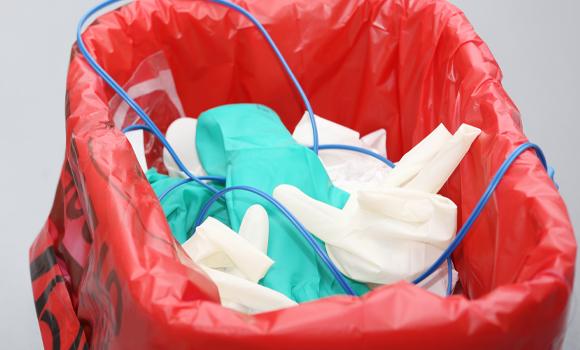Medical Waste Removal Excellence: Your Relied On Companion in Safe Biohazard Disposal
Medical Waste Removal Excellence: Your Relied On Companion in Safe Biohazard Disposal
Blog Article
Discovering Various Garbage Disposal Options for a Cleanser Setting
In the pursuit of a cleaner environment, the management of garbage disposal has actually arised as a critical focal point for sustainable development. With a multitude of waste disposal alternatives available, varying from traditional land fill approaches to innovative waste-to-energy technologies, the option of just how we handle our waste has significant effects for our earth's health. By analyzing the different approaches and strategies utilized in reusing, composting, incineration, land fill administration, and waste-to-energy procedures, a deeper understanding of their influences and performance can be acquired. The mission for optimum waste disposal methods that focus on ecological preservation while fulfilling the demands of an expanding population remains a pushing problem in today's globe.
Recycling Methods
Carrying out efficient reusing methods is crucial in decreasing waste and promoting sustainability in our atmosphere. Recycling entails the procedure of transforming waste products into recyclable things to protect against unnecessary disposal.
An additional crucial recycling approach is composting, which entails breaking down natural waste like food scraps and lawn trimmings right into nutrient-rich soil. This procedure not just diverts organic waste from landfills however also creates a useful source for gardening and farming. Additionally, upcycling is an innovative recycling technique that entails changing old or discarded materials into products of higher quality or value. By incorporating these various reusing approaches right into our waste administration methods, we can substantially minimize our environmental footprint and relocate towards a more sustainable future.

Composting Strategies
Reliable waste monitoring techniques, such as recycling techniques, lead the way for a cleaner setting, and now, shifting the focus to 'Composting Techniques', we explore lasting ways to decay organic waste for ecological benefit. medical waste removal.
Composting is an all-natural process that changes natural waste, like food scraps and yard trimmings, right into a nutrient-rich soil modification. The secret to successful composting hinges on producing the right equilibrium of eco-friendly products, such as fruit and vegetable scraps, and brownish materials, like dried out fallen leaves and branches. These products decay with the assistance of microbes, breaking down the waste into useful compost.
Traditional backyard composting entails layering natural materials in a bin or heap and consistently turning the mix to freshen it. By utilizing composting strategies, we can lower the amount of waste sent to garbage dumps while developing a useful item for enriching soil and sustaining plant development.
Incineration Advantages And Disadvantages
Incineration, as a waste disposal technique, provides both benefits and drawbacks that merit cautious factor to consider in the world of lasting waste monitoring techniques. On the favorable side, incineration can dramatically lower the quantity of waste, reducing the need for garbage dump space and possibly decreasing greenhouse gas exhausts. Incineration likewise enables the recuperation of energy via the generation of electrical energy or heat, adding to source recovery. The procedure can be used to ruin unsafe compounds, supplying a secure method for dealing with particular types of waste that might position threats to public wellness and the environment if left unattended.
Furthermore, the high first financial investment and operational expenses of incineration centers posture economic difficulties, making it a less economical option compared to various other waste monitoring approaches. Cautious tracking and regulation are essential to mitigate these adverse effects and optimize the benefits of incineration as part of a comprehensive waste management strategy.
Landfill Management Techniques
Landfills play a crucial role in waste management and environmental conservation by supplying a control system for the disposal of solid waste materials. By compacting the waste, the quantity is minimized, enabling for more waste to be suited over time.
In addition, the execution of everyday cover methods is vital in minimizing smells, stopping litter, and reducing the destination of bugs. Treatment the disposed waste at the end of each day aids to consist of odors and avoid potential ecological contamination. Furthermore, the tracking of landfill gas exhausts and leachate degrees is vital in guaranteeing that environmental criteria are satisfied and that any possible threats to surrounding ecosystems are minimized.

Waste-to-Energy Technologies
Among the cutting-edge strategies to throw away monitoring entails using Waste-to-Energy modern technologies to transform strong waste right into useful power resources. Waste-to-Energy (WtE) innovations include a variety of processes that intend to remove energy from waste materials with thermal, chemical, or biological ways. This conversion process not only minimizes the quantity of waste that winds up in land fills yet additionally generates important energy resources such as electricity, warmth, or biofuels.
Incineration involves melting waste at high temperature levels to produce heat and electricity. Gasification transforms waste right into a syngas, which can be utilized for power generation or chemical manufacturing.
Executing Waste-to-Energy technologies can aid reduce ecological problems related to traditional garbage disposal methods while all at once supplying a renewable resource source. Nonetheless, cautious consideration needs to be offered to discharges control and ensuring the sustainability of feedstock materials for these technologies to be absolutely useful for a cleaner environment.

Final Thought
To conclude, discovering numerous garbage disposal alternatives such as reusing, composting, incineration, land fill monitoring, and waste-to-energy technologies is important for promoting a cleaner environment - click here. Each method has its own advantages and obstacles, yet by making use of a combination of these methods, we can function in the direction of lowering the amount of waste that finishes up in land fills and ultimately add to a more sustainable future for generations to come
With a multitude of waste disposal options available, ranging from conventional garbage dump techniques to ingenious waste-to-energy innovations, the option of exactly how we manage our waste has significant ramifications for our world's wellness. medical waste removal near me.Incineration, as a waste disposal approach, provides both advantages and drawbacks that merit cautious consideration in the realm of sustainable waste management practices.Landfills play a vital function in waste administration and ecological preservation by providing a containment system for the disposal of solid waste materials. By condensing the waste, the volume is lowered, allowing for more waste to be accommodated over time
One of the innovative techniques to lose monitoring entails using Waste-to-Energy modern technologies to transform strong waste right into useful power sources.
Report this page